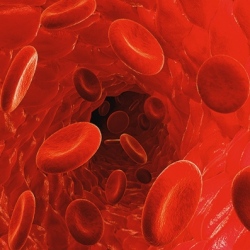
A new study concludes that regular blood donors are not at a greater risk of a premature death than those who rarely donate blood. The results even suggest that the most frequent donors may live longer than those who have only given blood a few times. The study was conducted by researchers at the University of Copenhagen, Denmark.
"My response to the results is primarily of relief. Those who have donated a lot of blood live longer than those who have donated a little, and there is no evidence that it is dangerous to donate blood," says co-author Professor Henrik Ullum.
There are several well known side-effects of blood donation: fainting, near-fainting, and the sudden pain as the needle pierces the skin. But Ullum and his colleagues wanted to know whether it can also lead to an iron deficiency.
They compared data from millions of blood donors from Denmark and Sweden.
"It’s the world’s largest data set in this area. Scandinavia is the only place where people can write such an article because it’s the only place that has this kind of data," says Ullum.
"The study can be used to reassure blood donors and the blood banks. It says that it appears to be healthy and safe to donate. But we are still working to identify other effects that may impact upon your health," he says.
The study focused on the mortality rate among blood donors, because longevity is an indication of overall health.
Comparing blood donor status and year of death is fraught with difficulties. For one, blood banks reject applications from potential blood donors for a number of health reasons. For example, if you have AIDS, high blood pressure, or diabetes.
So, it is typically only healthy people who actually donate their blood, and that makes it difficult to compare donors with non-donors when investigating the health impacts associated with giving blood.
This is referred to as ‘The Healthy Donor Effect’, and is one of the problems that Ullum and his team had to overcome in their study. "What is new is that we compare blood donors with [other] blood donors,” says Ullum.
“We compare the risk of dying within a few years [of donating blood] in those who have only donated blood a few times and those who have donated blood many times," says Ullum.
Hard to overcome ‘The Healthy Donor Effect’
But the ‘healthy donor effect’ is still a problem when comparing donors with other donors, as the most frequent blood donors are also likely to be healthier than those who donate less frequently.
To adjust for this, the researchers looked for other risk factors of premature death among a group of people who may not donate blood quite so often for reasons other than health.
Ullum and his team looked at elderly donors, who had stopped donating due to age rather than disease. They studied this group to adjust the rest of their data for ‘The Healthy Donor Effect’.
"When we compare with other blood donors and adjust [for the ‘Healthy Donor Effect’], we still see that people who have donated a lot, have a lower risk of dying the following year," says Ullum.
According to Morten Frydenberg, an associate professor of biostatistics at the Aarhus University, Denmark, this adjustment based on elderly donors is the study’s biggest weakness.
"They assume that ‘The Healthy Donor Effect’ is the same for all age groups. They take data from pensioners and hope that the same is true for those who still donate,” says Frydenberg.
“This is probably the right way to do it for the data that they have, but it doesn’t necessarily mean that they’ve solved the problem," he says. Ullum agrees, adding that there is no reason to conclude that regular blood donation will increase your life expectancy.
Why could active blood donors live longer? There are many possible reasons that could explain why active blood donors appear to live longer, according to the new study. Ullum is not sure that the act of donating blood itself is directly responsible.
Some people, who have too much iron in their blood, could benefit from blood donation if it helps to reduce their iron levels, he says. But Frydenberg has other suggestions. "Going into hospital could make you more aware that you must take care of your body,” he says, adding that there could be a number of other different explanations.
